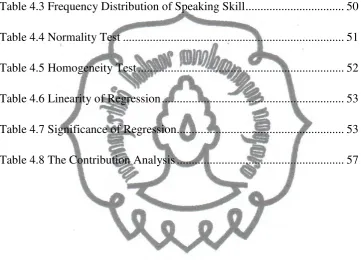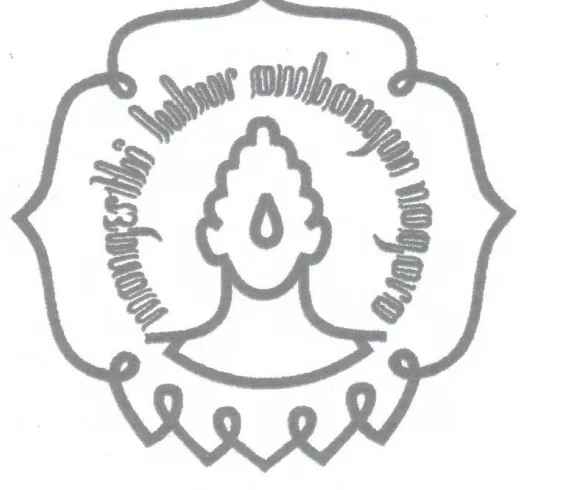commit to user
i
CORRELATION BETWEEN EXTROVERSION PERSONALITY,
VOCABULARY MASTERY, AND SPEAKING SKILL
(A Correlational Study between Extroversion Personality, Vocabulary Mastery, and Speaking Skill of the Fourth Semester Students of English Education Department of Teacher Training and Education Faculty in the
Academic Year of 2012/2013)
A Thesis
Submitted to Teacher Training and Education Faculty of Sebelas Maret
University as a Partial Requirement for Getting the Undergraduate Degree
in English Education
By:
SHELIA ANJARANI
K2209082
ENGLISH EDUCATION DEPARTMENT
TEACHER TRAINING AND EDUCATION FACULTY
SEBELAS MARET UNIVERSITY
SURAKARTA
commit to user
commit to user
iii
ABSTRACT
Shelia Anjarani. K2209082. A Correlational Study between Extroversion
Personality, Vocabulary Mastery, and Speaking Skill of the Fourth Semester Students of English Education Department of Teacher Training and Education Faculty Sebelas Maret University in the Academic Year of 2012/2013. English Education Department. Teacher Training and Education Faculty of Sebelas Maret University. Surakarta. 2013
The objectives of this research are to find out the correlation between (1) extroversion personality and speaking skill; (2) vocabulary mastery and speaking skill; and (3) extroversion personality and vocabulary mastery toward speaking skill.
This research was a correlational study, carried out in June 2013 at the English Education Department of Teacher Training and Education Faculty Sebelas Maret University. The population was all the fourth semester students of English Education Department which consisted of three classes. The total number of students was 92. The sample was 30 students taken by random sampling technique. The instruments in collecting the data were questionnaire and tests. The questionnaire was used to collect the data of extroversion personality; while the tests were used to collect the data of vocabulary mastery and speaking skill. The techniques used to analyze the data were Simple Correlation and Multiple Regression Correlation
The results of the data analysis show that in the level of significance α =
0.05 (1) there is a positive correlation between extroversion personality and
speaking skill ( = 0.43 > = 0.361); (2) there is a positive correlation between
vocabulary mastery and speaking skill ( = 0.41 > = 0.361); (3) there is a
positive correlation between extroversion personality and vocabulary mastery
toward speaking skill ( = 0.5226 and =5.07 > =3.35).
The results of this research also show that extroversion personality and vocabulary mastery are important factors that give contribution to speaking skill. Both extroversion personality and vocabulary mastery have positive contribution to speaking skill, that is 27.19%. Thus, extroversion personality and vocabulary mastery should be considered in increasing speaking skill, although the factors do not only come from those variables.
commit to user
commit to user
commit to user
vi
MOTTO
Don’t ever let someone tell you that you can’t do something. You got a
dream, you got to protect it. When people can’t do something themselves, they are
gonna tell you that you can’t do it. If want something, go get it, PERIOD!
commit to user
vii
DEDICATION
Though only my name appears on the cover of this thesis, a great many
people have contributed to its writing. I owe my gratitude to all those people who
have made this thesis possible and because of whom my undergraduate
experience will be one that I will cherish forever.
Most importantly, none of this would have been possible without love and
patience of my parents. My Mom and Dad to whom this thesis is dedicated to,
have been a constant source of love, concern, support, and strength all these years.
I am also thankful to Widoro Asri 2 Family for the various forms of
support during writing this thesis.
My ASF and IDYF friends for their support and care helped me overcome
setbacks and stay focused on writing this thesis. I greatly value our friendship and
commit to user
viii
ACKNOWLEDGMENT
Alhamdulillah all praises just be to Allah SWT, the Merciful Lord, for His
blessing to the researcher, helping, and giving her mercy, guidance, health,
strength, and everything during working and finishing this thesis. The researcher
received support, advice, and assistance from many people. Thus, she would like
to express her gratitude to those who give great contribution to the researcher to
finish this thesis:
1. The Dean of Teacher Training and Education Faculty
2. The Head of English Education Department, Endang Setyaningsih,
S.Pd, M.Hum.
3. Dr. Abdul Asib, M.Pd, as the first consultant and as the academic
consultant for his time, patience, help, correction, guidance, and
suggestion.
4. Hefy Sulistyawati, S.S, as the second consultant for her time, patience,
help, correction, guidance, and suggestion.
5. All lecturers in English Education Department program for the
precious knowledge.
6. The fourth semester students of class A, B, and SBI in the academic
year of 2012/2013 for cooperating during the research.
The researcher accepts gratefully every comment and suggestion because
nothing is perfect except Allah SWT, and neither is this thesis. However, she
hopes that this thesis will be useful to the improvement of the English teaching
and learning.
Surakarta, …… 2013
commit to user
ix
TABLE OF CONTENTS
TITLE ... i
PRONOUNCEMENT ... ii
ABSTRACT ... iii
APPROVAL OF THE CONSULTANTS ... iv
APPROVAL OF THE THESIS EXAMINERS ... v
MOTTO ... vi
DEDICATION ... vii
ACKNOWLEDGEMENT ... viii
TABLE OF CONTENTS ... ix
LIST OF TABLES ... xii
LIST OF ABBREVIATIONS ... xiii
LIST OF FIGURES ... xiv
LIST OF APPENDICES ... xv
CHAPTER I: INTRODUCTION A. Background of the Study ... 1
B. Problem Identification ... 3
C. Problem Limitation ... 4
D. Problem Statement ... 4
E. Objectives of the Research ... 5
commit to user
x
A. Review of Speaking Skill ... 7
1. Definition of Speaking ... 7
2. Notion of Speaking Skill ... 9
3. Problems in Speaking ... 11
4. Macro and Micro Skills of Speaking ... 12
B. Review of Vocabulary Mastery ... 14
1. Definition of VocabularyMastery ... 14
2. Kinds of Vocabulary ... 15
3. Vocabulary Mastery ... 16
4. The Importance of Learning Vocabulary ... 19
C. Review of Extroversion Personality ... 20
1. Definition of Personality ... 20
2. Definition of Extroversion ... 22
3. Measuring Extroversion ... 26
D. Review of Related Research ... 27
E. Rationale ... 28
F. Hypotheses... 30
CHAPTER III: RESEARCH METHODOLOGY A. Setting of the Research ... 31
B. The Method of the Research ... 31
C. Population, Sample, and Sampling ... 32
D. The Technique of Collecting Data ... 34
E. The Readability of the Test Instruction ... 38
F. The Validity of the Instrument ... 39
G. The Reliability of the Instrument ... 41
H. The Pre-requirement Test ... 42
I. The Technique of Analyzing Data ... 45
commit to user
xi
1. Extroversion Personality Data ... 48
2. Vocabulary Mastery Data ... 49
3. Speaking Skill Data ... 50
B. Pre-requisite Tests Results... 51
1. Normality Test ... 51
2. Homogeneity Test ... 52
3. Linearity of Regression Test ... 53
4. Significance of Regression Test ... 53
C. The Hypotheses Testing ... 54
D. The Contribution Analysis... 57
E. The Discussion of the Research Finding ... 57
CHAPTER V: CONCLUSION, IMPLICATION, AND SUGGESTION A. Conclusion ... 60
B. Implication ... 61
C. Suggestion ... 62
BIBLIOGRAPHY ... 63
commit to user
xii
Table 3.1 Scoring rubric of Speaking Skill ... 35
Table 4.1 Frequency Distribution of Extroversion Personality ... 48
Table 4.2 Frequency Distribution of Vocabulary Mastery ... 49
Table 4.3 Frequency Distribution of Speaking Skill ... 50
Table 4.4 Normality Test ... 51
Table 4.5 Homogeneity Test ... 52
Table 4.6 Linearity of Regression ... 53
Table 4.7 Significance of Regression... 53
commit to user
xiii
LIST OF ABBREVIATIONS
SLA : Second Language Acquisition
commit to user
xiv
Figure 3.1 Diagram of the Relationship of the Variables ... 32
Figure 4.1 Histogram and Polygon of Extroversion Personality ... 49
Figure 4.2 Histogram and Polygon of Vocabulary Mastery ... 50
commit to user
xv
LIST OF APPENDICES
Appendix 1 List of Students Joining Try Out. ... 68
Appendix 2 List of Students Joining The Test ... …..70
Appendix 3a The Blueprint of Extroversion Personality (Try Out) ... 72
Appendix 3b The Instrument of Extroversion Personality (Try Out) ... 73
Appendix 3c The Answer Key of Extroversion Personality (Try Out) ... 77
Appendix 4 Student’s Worksheet of Extroversion Personality (Try Out) ... 80
Appendix 5a The Blueprint of Vocabulary Mastery (Try Out) ... 84
Appendix 5b The Instrument of Vocabulary Mastery (Try Out) ... 85
Appendix 5c The Answer Key of Vocabulary Mastery (Try Out) ... 94
Appendix 6 Student’s Worksheet of Vocabulary Mastery (Try Out) ... 95
Appendix 7a The Blueprint of Extroversion Personality (Data) ... 104
Appendix 7b The Instrument of Extroversion Personality (Data) ... 105
Appendix 7c The Answer Key of Extroversion Personality (Data) ... 108
Appendix 8 Student’s Worksheet of Extroversion Personality (Data) ... 110
Appendix 9a The Blueprint of Vocabulary Mastery (Data) ... 113
Appendix 9b The Instrument of Vocabulary Mastery (Data) ... 114
Appendix 9c The Answer Key of Vocabulary Mastery (Data)... 119
Appendix 10 Student’s Worksheet of Vocabulary Mastery (Data) ... 120
Appendix 11 Student’s Speaking Score ... 125
commit to user
xvi
Appendix 13a Reliability Test of Extroversion Personality ... 129
Appendix 13b The Computation of Reliability Test of Extroversion ... 130
Appendix 14a Validity Test of Vocabulary Mastery ... 131
Appendix 14b The Computation of Validity Test of Vocabulary... 132
Appendix 15a Reliability Test of Vocabulary Mastery ... 133
Appendix 15b The Computation of Reliability Test of Vocabulary ... 134
Appendix 16 Score of the Results of the Students ... 135
Appendix 17 The Descriptive Statistics of Each Variable ... 136
Appendix 18 Normality Test ... 142
Appendix 19 Homogeneity Test ... 148
Appendix 20 Linearity and Significance Test ... 153
Appendix 21 Single Correlation... 161
Appendix 22 Multiple Regression ... 167
Appendix 23 Relative and Effective Contribution ... 170
Appendix 24 r-Table ... 171
Appendix 25 F-Table ... 172
Appendix 26 t-Table ... 173
Appendix 27 Chi Square Table ... 174
Appendix 28 Photograph ... 175

